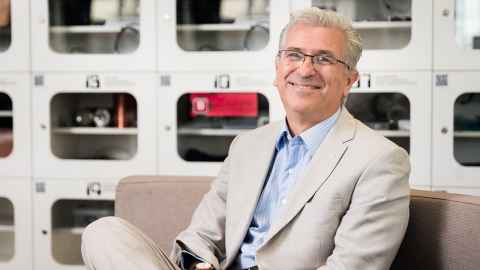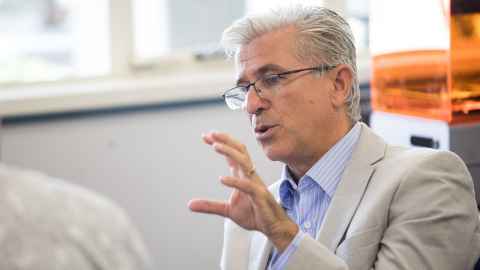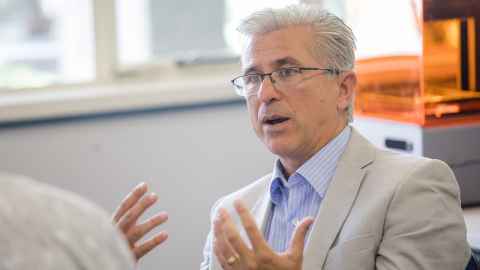Freedom to develop ideas on the southern space frontier
9 December 2019
The University of Auckland’s leadership role in New Zealand’s fledgling space sector has received a significant boost with the appointment of the internationally leading Professor Guglielmo Aglietti as the inaugural Director* of Te Pūnaha Ātea – Auckland Space Institute.

A FELLOW OF THE Royal Academy of Engineering, Guglielmo graduated in Italy with a first-class honours degree in Aerospace Engineering before working on the Columbus module of the International Space Station. In 1995, he moved to the UK, working initially at the University of Southampton before moving to Surrey as director of the UK’s Surrey Space Centre.
“I have always worked in this area between academia and industry trying to bridge the gap by doing research, proof of concepts and ideas that can be developed in industry.”
His recruitment was made possible by the Tertiary Education Commission’s Entrepreneurial Universities scheme. The scheme aims to attract world-leading entrepreneurial academics who will drive cutting-edge research that grows New Zealand’s competitive edge – and strengthens economic growth.
Describing the alignment between research, education and industrial activities as crucial, Guglielmo says that universities are a favourable environment to generate new ideas and new products with commercial potential which can then be spun off to create a virtuous circle of collaboration.
“These companies will grow and will end up sponsoring research at the University, so you’ll have a whole ecosystem that really works very well.”
After seven years at Surrey and various successful space missions, Guglielmo says it was time for a change and that “starting from scratch” at Te Pūnaha Ātea gives him an opportunity to shrug off a lot of the constraints from his old job and have “almost a blank canvas to get things together”.
*Prior to Professor Guglielmo Aglietti's appointment, Professor Richard Easther, Head of the Department of Physics acted as interim Director

New opportunities ahead in Aotearoa
As a multi-faculty space science and engineering initiative, one of the key capabilities of Te Pūnaha Ātea is to develop satellite missions to serve New Zealand’s strategic scientific and economic goals. Guglielmo says that being able to contribute to the growth of the New Zealand space sector represents a “very nice challenge to put in practice what I’ve learned”.
Collaboration with key commercial partners, like Rocket Lab, is another goal. Being close to the launchers was something that Guglielmo missed in the UK where they had to rely on countries like India, the US or China to get things launched. “Not having direct access to space is always a bit of a problem,” he says.
Rocket Lab founder Peter Beck clearly sees the value of working together with the University, according to Guglielmo, and companies will be encouraged to use the University for cost effective research and development work – rather than invest in their own facilities – “because they can tap into our resources only when they need it”.
In that regard, one obvious opportunity could be to support Rocket Lab with its ambitious plan announced in August 2019 to recover and re-fly the company’s Stage One Electron launch vehicles. As someone who understands the aerodynamics of re-entry all too well, Guglielmo says “it might be the kind of research that can be contracted to the University to provide specific answers”.
Te Pūnaha Ātea is currently working on several projects in collaboration with researchers in the US, Germany and Australia, and Guglielmo is keen to contribute to international projects that can produce a critical mass where “everybody benefits from the results, but we only pay a fraction of the bill”.
I have always worked in this area between academia and industry trying to bridge the gap by doing research, proof of concepts and ideas that can be developed in industry.
A fundamental education for students
Developing a dedicated ground mission control station like the one in Surrey is also on the drawing board, and it’s possible that both space centres could potentially co-ordinate activities across different time zones. “Working together we have much better visibility and much better communication than if we were working independently.”
A key influence in the evolution of Te Pūnaha Ātea has been the Auckland Programme for Space Systems (APSS). Over the past three years APSS has attracted more than 400 undergraduates eager to participate in the extracurricular Mission Proposal Competition which involves the design of tiny CubeSat satellites – but offers no course credits.
However, that might be about to change. Guglielmo says he’d like to “enable” students by providing a fundamental education in satellite development that counts in terms of final marks. It means that when they embark on APSS projects they’ll “hit the ground running” and go much further, instead of having to learn the basics of space engineering during the project.
Also on the cards is a dedicated multidisciplinary programme in space engineering or aerospace engineering, with Te Pūnaha Ātea acting as the catalyst, which would draw on the academic talent which already exists within different faculties at the University. As Guglielmo puts it, “if you get these things working together you create a synergy, so the value added is much higher than the value of your single parts working independently”.
What’s more, he believes that being able to provide a pipeline of graduates is a win-win situation because it helps meet the growing employment needs of companies like Rocket Lab and provides graduates with immediate job prospects. That, in turn, helps the University “because we can show that what we’re teaching is actually useful and they can get jobs in real companies, so it really works for everybody”.
Tackling real issues can lead to commercial success
During his time at the Surrey Space Centre Guglielmo was the Principal Investigator for the internationally acclaimed RemoveDEBRIS project which successfully tested technologies for Active Debris removal (ADR) such as a net and a harpoon.
The mission was part of a proof of concept exercise which will hopefully pave the way for future commercial development, but Guglielmo says the challenge for Surrey’s commercial partners now is to find a paying customer. “It’s a bit like the problem with plastic in the ocean, it’s a good idea to clean it up but who is going to pay for that?”
Nevertheless, he says that universities have a duty to address real issues like space junk. “There’s a clear need for methodologies to remove new satellites once they have finished their missions – and old pieces of debris – which has a lot of potential to expand technologies and create new commercial opportunities,” he says.
In November, Guglielmo’s international RemoveDebris team were awarded a prestigious Sir Arthur C. Clarke Award in the Space Achievement: Industry/Project Team category. The award, given out annually, recognises outstanding contributions to space exploration activities. “This is a great honour, as we consider these awards like the ‘Oscars’ of the UK space sector. I am delighted for the whole team that worked tirelessly on this project,” says Professor Aglietti.
As the 2018 winner of the APSS Satellite Mission Proposal Competition, the ‘Kessler’ team (see page 20) has proposed the use of electrodynamic tethers to retrieve old satellites, and Guglielmo says students are often the ones with good ideas for new products. “We’re going to create more opportunities for students to transform their ideas into proper enterprises with commercial values and real products.”
The ultimate aim will be to create a broader space ecosystem by enabling companies to generate a wider range of services and products for further development. “We want to have an entrepreneurial spirit that creates these new companies and helps them to expand and grow on their own strength after they’ve been initially supported by the University – as well as helping existing companies to prosper.”
And it seems that Guglielmo won’t be alone in his quest. Given the uncertainties created by Brexit, he says that some of his former colleagues have also indicated a willingness to move to what they consider to be a more fertile environment. “Europe is a relatively crowded place from a space point of view and here there is more freedom to develop new ideas.”
APSS | www.apss.space.auckland.ac.nz
Te Pūnaha Ātea | Auckland Space Institute

inSCight
This article appears in the December 2019 edition of inSCight, the print magazine for Faculty of Science alumni. View more articles from inSCight.
Contact inSCight.